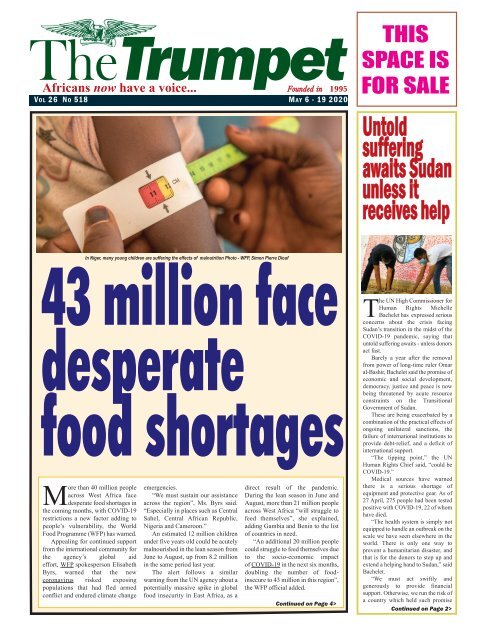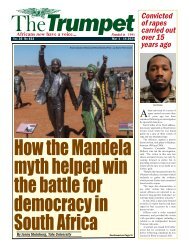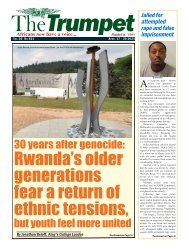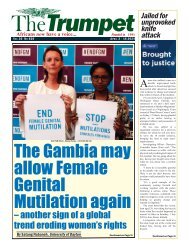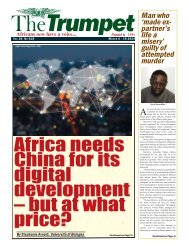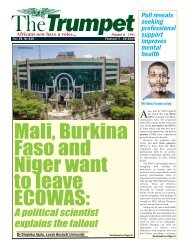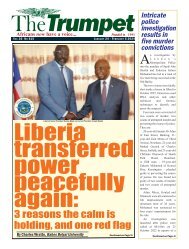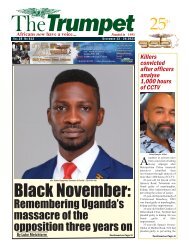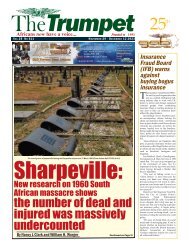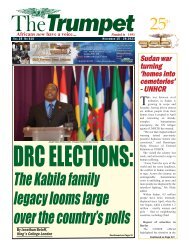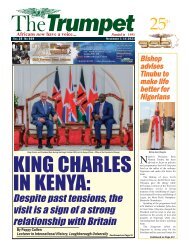The Trumpet Newspaper Issue 518 (May 6 - 19 2020)
43 million face desperate food shortages
43 million face desperate food shortages
You also want an ePaper? Increase the reach of your titles
YUMPU automatically turns print PDFs into web optimized ePapers that Google loves.
<strong>The</strong><strong>Trumpet</strong><br />
Africans now have a voice... Founded in <strong>19</strong>95<br />
V O L 26 N O <strong>518</strong> M AY 6 - <strong>19</strong> <strong>2020</strong><br />
THIS<br />
SPACE IS<br />
FOR SALE<br />
Untold<br />
suffering<br />
awaits Sudan<br />
unless it<br />
receives help<br />
In Niger, many young children are suffering the effects of malnutrition Photo - WFP, Simon Pierre Diouf<br />
43 million face<br />
desperate<br />
food shortages<br />
More than 40 million people<br />
across West Africa face<br />
desperate food shortages in<br />
the coming months, with COVID-<strong>19</strong><br />
restrictions a new factor adding to<br />
people’s vulnerability, the World<br />
Food Programme (WFP) has warned.<br />
Appealing for continued support<br />
from the international community for<br />
the agency’s global aid<br />
effort, WFP spokesperson Elisabeth<br />
Byrs, warned that the new<br />
coronavirus risked exposing<br />
populations that had fled armed<br />
conflict and endured climate change<br />
emergencies.<br />
“We must sustain our assistance<br />
across the region”, Ms. Byrs said.<br />
“Especially in places such as Central<br />
Sahel, Central African Republic,<br />
Nigeria and Cameroon.”<br />
An estimated 12 million children<br />
under five years old could be acutely<br />
malnourished in the lean season from<br />
June to August, up from 8.2 million<br />
in the same period last year.<br />
<strong>The</strong> alert follows a similar<br />
warning from the UN agency about a<br />
potentially massive spike in global<br />
food insecurity in East Africa, as a<br />
direct result of the pandemic.<br />
During the lean season in June and<br />
August, more than 21 million people<br />
across West Africa “will struggle to<br />
feed themselves”, she explained,<br />
adding Gambia and Benin to the list<br />
of countries in need.<br />
“An additional 20 million people<br />
could struggle to feed themselves due<br />
to the socio-economic impact<br />
of COVID-<strong>19</strong> in the next six months,<br />
doubling the number of foodinsecure<br />
to 43 million in this region”,<br />
the WFP official added.<br />
Continued on Page 4><br />
<strong>The</strong> UN High Commissioner for<br />
Human Rights Michelle<br />
Bachelet has expressed serious<br />
concerns about the crisis facing<br />
Sudan’s transition in the midst of the<br />
COVID-<strong>19</strong> pandemic, saying that<br />
untold suffering awaits - unless donors<br />
act fast.<br />
Barely a year after the removal<br />
from power of long-time ruler Omar<br />
al-Bashir, Bachelet said the promise of<br />
economic and social development,<br />
democracy, justice and peace is now<br />
being threatened by acute resource<br />
constraints on the Transitional<br />
Government of Sudan.<br />
<strong>The</strong>se are being exacerbated by a<br />
combination of the practical effects of<br />
ongoing unilateral sanctions, the<br />
failure of international institutions to<br />
provide debt-relief, and a deficit of<br />
international support.<br />
“<strong>The</strong> tipping point,” the UN<br />
Human Rights Chief said, “could be<br />
COVID-<strong>19</strong>.”<br />
Medical sources have warned<br />
there is a serious shortage of<br />
equipment and protective gear. As of<br />
27 April, 275 people had been tested<br />
positive with COVID-<strong>19</strong>, 22 of whom<br />
have died.<br />
“<strong>The</strong> health system is simply not<br />
equipped to handle an outbreak on the<br />
scale we have seen elsewhere in the<br />
world. <strong>The</strong>re is only one way to<br />
prevent a humanitarian disaster, and<br />
that is for the donors to step up and<br />
extend a helping hand to Sudan,” said<br />
Bachelet.<br />
“We must act swiftly and<br />
generously to provide financial<br />
support. Otherwise, we run the risk of<br />
a country which held such promise<br />
Continued on Page 2>
Page2 <strong>The</strong><strong>Trumpet</strong> MAY 6 - <strong>19</strong> <strong>2020</strong><br />
News<br />
Double tragedy as nurse<br />
loses husband and son<br />
- from COVID-<strong>19</strong> related illness, and stabbing respectively<br />
London’s Metropolitan Police<br />
detectives continue to appeal for<br />
information following the fatal<br />
stabbing of 24-year-old Marketing<br />
graduate - David Gomoh in Newham.<br />
<strong>The</strong> Southbank University graduate<br />
was stabbed to death at around 22:25hrs<br />
on Sunday, 26 April, just seconds after<br />
leaving his home.<br />
<strong>The</strong> attack took place in Freemasons<br />
Road, E16 near the junction with Kerry<br />
Close - in London’s east end.<br />
David’s family were already reeling<br />
from tragedy, following the recent<br />
unexpected death of David’s father from<br />
a COVID-<strong>19</strong> related illness.<br />
His father’s funeral was to be<br />
tomorrow.<br />
David, like his mother who is a nurse,<br />
worked for the NHS and was a key<br />
worker helping to keep NHS staff<br />
supplied with essential equipment.<br />
David was talking on the phone to a<br />
female friend when he was stabbed and<br />
was not involved in any argument.<br />
Nothing in David’s background gives<br />
any reason for why he was singled out<br />
and this, along with other evidence,<br />
suggests David was murdered in a totally<br />
unprovoked attack.<br />
Detective Inspector Tony Kirk of the<br />
Metropolitan Police Specialist Crime<br />
Command said. “David’s family are<br />
going through unimaginable torment.<br />
Within days his mother has seen the death<br />
of her husband and son; his sister has lost<br />
her brother and father, both are now<br />
heartbroken.<br />
“David was a young man who had<br />
worked hard to put himself through<br />
university and, like his mother, worked<br />
hard for the community in the NHS. At<br />
this time we believe the only thing David<br />
did to be murdered was walk down a<br />
street. He was apparently approached by<br />
a group of men wearing masks and<br />
stabbed multiple times in a ferocious<br />
assault.<br />
“I have no doubt this was a planned<br />
attack that singled out David because he<br />
happened to be in that area. David and his<br />
mother, who have done so much to help<br />
the community, now need the public to<br />
come forward and tell us what they know.<br />
If you have any information, please think<br />
of this young man and the suffering of his<br />
family and call us. If you don’t want to<br />
give your name, call Crimestoppers, but<br />
do make that call. David’s family deserve<br />
both answers and justice.”<br />
Police believe those involved left the<br />
scene in a stolen Silver Dodge Caliber<br />
that was abandoned at about 22:30hrs in<br />
Lincloln Road, E13 after driving through<br />
the no entry sign from Cumberland Road.<br />
This car had been stolen in Dagenham<br />
on Thursday, 16 April and was on cloned<br />
plates when it was recovered.<br />
Police want to speak to anyone who<br />
was in the area or anyone who<br />
remembers seeing this car, whether<br />
before or after the attack.<br />
In particular, anyone who has dash<br />
cam footage, or CCTV of the area around<br />
where the car was dumped, should<br />
contact detectives.<br />
Detectives from the Met’s Specialist<br />
Crime Command (Homicide) are<br />
standing by to take your call.<br />
<strong>The</strong>re have been no arrests at this<br />
time.<br />
Any witnesses or anyone with any<br />
information is asked to call detectives at<br />
the incident room on 0208 345 3985.<br />
You can also contact via 101 or<br />
Twitter @MetCC. Please quote CAD<br />
8371/26APR.<br />
To give information anonymously<br />
contact Crimestoppers on 0800 555 111<br />
or online at crimestoppers-uk.org.<br />
++ Do you know about someone who<br />
is carrying a knife or is involved in<br />
violence? If you have information that<br />
David Gomoh - Killed<br />
could help keep your community safe,<br />
but don’t want to speak to police, please<br />
contact the independent charity<br />
Crimestoppers on 0800 555 111. <strong>The</strong>y do<br />
not ask your name and cannot trace your<br />
call or I.P address.<br />
Any young people who has<br />
information about violence or knife<br />
crime, can visit www.fearless.org where<br />
they can pass on information<br />
anonymously – your I.P address will not<br />
be traced. Fearless is part of the<br />
Crimestoppers charity, and is also<br />
independent of the police.<br />
Untold suffering awaits Sudan unless<br />
it receives help<br />
Continued from Page 1<<br />
relapsing back into political instability and<br />
potential conflict.”<br />
In a letter to the UN Secretary-General<br />
on 8 April <strong>2020</strong>, Sudan’s Prime Minister<br />
Abdalla Hamdok acknowledged that<br />
COVID-<strong>19</strong> poses profound challenges to<br />
his country’s health system, economy, and<br />
society as a whole, and he sought financial<br />
and other technical support to tackle the<br />
pandemic.<br />
Of Sudan’s population of 43 million<br />
people, nearly 2 million remain internally<br />
displaced as a result of conflicts in Darfur,<br />
South Kordofan, and Blue Nile State. Most<br />
face dire conditions, living in camps or<br />
settlements, unable to meet their basic<br />
needs. Sudan also hosts more than 1.1<br />
million refugees and migrants.<br />
Even before the arrival of COVID-<strong>19</strong>,<br />
many Sudanese were battling to make ends<br />
meet due to high unemployment, soaring<br />
inflation, and lack of social protection and<br />
safety nets. <strong>The</strong>se issues have been<br />
compounded by the effects of Sudan still<br />
being on the US list of States sponsoring<br />
terrorism. In addition, Sudan is currently<br />
among the countries not eligible to access<br />
the US$50-billion Trust Fund of the<br />
International Monetary Fund and World<br />
Bank to assist countries to fight COVID-<br />
<strong>19</strong>.<br />
Separately, the UN Secretary-General<br />
has urged the international community to<br />
do all it can to support the country in its<br />
transition, and during this time of serious<br />
need.<br />
“<strong>The</strong> only way Sudan will ever be able<br />
to break out of this cycle of poverty and<br />
desperation is to be freed from the<br />
impediments of sanctions imposed at the<br />
time of the previous government. This<br />
would enable Sudan to attract investment<br />
for its much-needed economic reforms, and<br />
to fully access funds of the international<br />
financial institutions,” said Bachelet.<br />
“Inequality, and economic and social<br />
grievances, were the main triggers of<br />
Sudan’s revolution last year. If these and<br />
other root causes are not addressed as a<br />
matter of priority, Sudan’s successful<br />
transition to achieving a durable peace<br />
remains distant.”<br />
Do you have land in Nigeria that you want to develop?<br />
We (www.ukuldacoop.org) are a UK-based Nigeria-Mass-Housing-cum-<br />
Infrastructure-Development-Focused Cooperative.<br />
Do you have land with "C of O" in a good location in Nigeria that you want to<br />
develop? We may be the "JV" (Joint Venture)<br />
Funding and Technical partners you need.<br />
Contact us: +44 (0) 7956 675412<br />
info@ukuldacoop.org / www.ukuldacoop.org
MAY 6 - <strong>19</strong> <strong>2020</strong> <strong>The</strong><strong>Trumpet</strong><br />
Page3
Page4<br />
<strong>The</strong><strong>Trumpet</strong><br />
<strong>The</strong><strong>Trumpet</strong> Group<br />
Tel: 020 8522 6600<br />
Field: 07956 385 604<br />
E-mail:<br />
info@the-trumpet.com<br />
<strong>The</strong><strong>Trumpet</strong>Team<br />
PUBLISHER / EDITOR-IN-CHIEF:<br />
’Femi Okutubo<br />
CONTRIBUTORS:<br />
Moji Idowu, Ayo Odumade,<br />
Steve Mulindwa<br />
SPECIAL PROJECTS:<br />
Odafe Atogun<br />
John-Brown Adegunsoye (Abuja)<br />
DESIGN:<br />
Xandydesigns@gmail.com<br />
ATLANTA BUREAU CHIEF:<br />
Uko-Bendi Udo<br />
3695 F Cascade Road #2140 Atlanta,<br />
GA 30331 USA<br />
Tel: +1 404 889 3613<br />
E-mail: uudo1@hotmail.com<br />
BOARD OF CONSULTANTS<br />
CHAIRMAN:<br />
Pastor Kolade Adebayo-Oke<br />
MEMBERS:<br />
Tunde Ajasa-Alashe<br />
Allison Shoyombo, Peter Osuhon<br />
<strong>The</strong><strong>Trumpet</strong> (ISSN: 1477-3392)<br />
is published in London fortnightly<br />
Advertising:<br />
020 8522 6600<br />
THINKING<br />
OF<br />
WRITING<br />
A BUSINESS<br />
PLAN?<br />
MAY 6 - <strong>19</strong> <strong>2020</strong><br />
We can help you develop a<br />
professional business plan<br />
from only £250.<br />
For more information, contact us<br />
at 07402792146 or email us at:<br />
tolu.oyewole@consultant.com<br />
Highest forced displacement in Africa<br />
Highlighting people’s vulnerabilities,<br />
Babar Baloch from the UN High<br />
Commissioner for Refugees (UNHCR),<br />
described West and Central Africa as<br />
“one of largest displacement situations<br />
in Africa…we are talking about 5.6<br />
million internally displaced people,<br />
more than 1.3 million refugees and 1.6<br />
million stateless.”<br />
<strong>The</strong> UN refugee agency has<br />
repeatedly called for greater support for<br />
increasing numbers of people forced to<br />
flee for their lives amid renewed conflict<br />
in West Africa’s turbulent Sahel and<br />
Lake Chad region.<br />
Burkina Faso has also witnessed<br />
massive displacement - of more than<br />
838,000 people since January 20<strong>19</strong> – a<br />
figure which keeps climbing with each<br />
passing day.<br />
In recent weeks, the agency said that<br />
armed groups had targeted thousands of<br />
Malian refugees sheltering in camps<br />
near the border of Burkina Faso and<br />
Mali.<br />
<strong>The</strong> agency condemned attacks on 2<br />
<strong>May</strong> on Malian refugees in Burkina<br />
Faso – “reportedly by the country’s<br />
security forces”, in Mentao refugee<br />
camp in which at least 32 people were<br />
injured.<br />
<strong>The</strong> camp is located in Burkina<br />
Faso’s volatile Sahel region close to the<br />
border with Mali and hosts some 6,500<br />
refugees, UNHCR said in a statement.<br />
For WFP the priority continues to be<br />
the most vulnerable individuals.<br />
Hand-to-mouth existence<br />
<strong>The</strong>y include “the urban poor - who<br />
live hand-to-mouth – (who) are most at<br />
risk”, Ms. Byrs said, highlighting how<br />
COVID-<strong>19</strong> travel restrictions had<br />
compromised the transport of supplies<br />
and the functioning of open-air markets<br />
that serve most people, resulting in price<br />
increases in some countries.<br />
Movement restrictions could also<br />
affect farmers as the planting season<br />
approaches, WFP said in a statement,<br />
warning that “an inadequate response”<br />
News<br />
43 million face desperate<br />
food shortages<br />
Continued from Page 1<<br />
to current needs “would put the future<br />
well-being of millions of people in the<br />
region at stake, particularly women and<br />
young children”.<br />
It could also lead to civil unrest in<br />
parts of a region already challenged by<br />
insecurity and violent extremism, the<br />
agency said, before adding that it was<br />
seeking to overcome challenges in<br />
partnership with the authorities.<br />
A significant problem is the halt in<br />
school meal distribution, which has<br />
affected 18 million pupils supported<br />
through Government-led programmes<br />
and 2.2 million schoolchildren in WFPsupported<br />
schools.<br />
“When Governments have had to<br />
close schools and stop (serving) school<br />
meals, we have worked with them,” said<br />
Ms. Byrs. “We are working with them,<br />
to organize distribution points for the<br />
most vulnerable families who can take<br />
food rations so that they aren’t<br />
penalized, as schools have been forced<br />
to shut, in line with confinement<br />
measures.”<br />
She added: “We have put in place<br />
monitoring and evaluation systems to<br />
help us to target the most at-risk<br />
populations, and we do that with<br />
partners, with Governments of course,<br />
and the international humanitarian<br />
community, in the largest sense of the<br />
term.”<br />
WFP urgently requires an additional<br />
$574 million to provide crucial<br />
assistance for the next six months in<br />
West Africa. <strong>The</strong>se requirements are<br />
likely to increase in the coming weeks<br />
as the impact of COVID-<strong>19</strong> is fully<br />
analysed.<br />
Bubble In Christ Music Band<br />
For your Music band with<br />
classic rendition for all<br />
occasions, with traditional,<br />
contemporary African<br />
international and Gospel filled<br />
with professional decent<br />
Presentation.<br />
More Musicians, Singers,<br />
Instrumentalists, handy men,<br />
Music directors band coordinators,<br />
Audio and/or video<br />
technicians, Drivers,<br />
Marketing Personnel are<br />
welcome.<br />
Contact: Olugbenga on<br />
07438 264613<br />
CHERUBIM & SERAPHIM MOVEMENT CHURCH<br />
Amazing Grace District -London Branch 2<br />
God’s Promises<br />
never fail:<br />
* Before they call I<br />
will answer; while<br />
they are still<br />
speaking I will hear<br />
(Isaiah 65: 24)<br />
Elisabeth Byrs<br />
WEEKLY DELIVERANCE SERVICE<br />
Deliverance: Every Wednesday<br />
Time: 6.30pm – 7pm (Individual Prayer & Counselling)<br />
Midweek Church Service: 7pm – 9pm<br />
Venue: Orange Room, Albany <strong>The</strong>atre, Douglas Way,<br />
London SE8 4AG<br />
Other Service: Sunday Thanks giving 11am – 1.30pm<br />
* He will call upon me and I<br />
will answer him: I will be<br />
with him in trouble, I will<br />
deliver him and honour him<br />
(Psalm 91: 15)<br />
For further information, contact - Church Secretary: S/M/I/I (Dr) I Oni-Owoyemi 07788 745231 Or<br />
Church Elders: S/A T Owoyemi 07956 996689 or / M/S/A W Ojomo 07939 836499 or / Apostle T Gbolasere 07484 243990<br />
Email: amazinggracebranch2@gmail.com
MAY 6 - <strong>19</strong> <strong>2020</strong> <strong>The</strong><strong>Trumpet</strong><br />
Page5
Page6 <strong>The</strong><strong>Trumpet</strong> MAY 6 - <strong>19</strong> <strong>2020</strong>
News<br />
MAY 6 - <strong>19</strong> <strong>2020</strong><br />
<strong>The</strong><strong>Trumpet</strong><br />
World Bank approves $40m to provide<br />
income support to South Sudan households<br />
Page7<br />
A$40 million grant from the World<br />
Bank’s International<br />
Development Association will<br />
fund a two and half years Project to<br />
provide income support to nearly 430,000<br />
low income South Sudanese. <strong>The</strong> Project<br />
will be implemented by the United<br />
Nations Office for Project Services<br />
(UNOPS) in South Sudan.<br />
UNOPS will deliver the South Sudan<br />
Safety Net Project (SSSNP), in<br />
partnership with the Ministry of<br />
Agriculture and Food Security, Ministry<br />
of Gender and Social Welfare and the<br />
Ministry of Finance and Planning to<br />
ensure that low income and vulnerable<br />
people are provided with reliable access<br />
to income opportunities and temporary<br />
employment.<br />
“I am very pleased that South Sudan<br />
is receiving additional funding which will<br />
be used to build on the achievements of<br />
previous safety net projects while scaling<br />
up the provision of predictable and<br />
reliable cash transfers to vulnerable South<br />
Sudanese,” said Hon. Josephine Joseph<br />
Lagu, Minister of Agriculture and Food<br />
Security. “This will not only improve<br />
food security for thousands of people, but<br />
it will also increase their resilience to<br />
economic and climate-related crises or<br />
shocks,” she added.<br />
<strong>The</strong> Project comes at the<br />
unprecedented time of the COVID-<strong>19</strong><br />
pandemic. In order to adapt the Project to<br />
the COVID-<strong>19</strong> context and address rising<br />
socio-economic vulnerability, the project<br />
will rapidly roll-out immediate ‘direct<br />
income support’ and respond to the<br />
economic impact of COVID-<strong>19</strong> on the<br />
lives of the vulnerable communities.<br />
“In the first phase, the SSSNP will<br />
scale up direct income support in Juba<br />
County to provide rapid cash transfers to<br />
address emerging vulnerabilities amidst<br />
COVID <strong>19</strong> outbreak. As the COVID <strong>19</strong><br />
situation subsides, cash transfers will be<br />
expanded in all the other nine project<br />
locations across the country,” said Husam<br />
Abudagga, World Bank Country<br />
Manager for South Sudan speaking at<br />
virtual project debrief meeting attended<br />
by the Minister of Agriculture and Food<br />
Security, and the Under Secretary of the<br />
Ministry of the Ministry of Agriculture<br />
and Food Security, the World Bank team,<br />
and UNOPS representatives.<br />
Peter Mutoredzanwa, the Country<br />
Representative of UNOPS in South<br />
Sudan reiterated that: “UNOPS<br />
continues to work closely with the World<br />
Bank, the Government of South Sudan<br />
and other key partners to deliver essential<br />
social services, improve living conditions<br />
and enhance social development.” He<br />
further added that “ <strong>The</strong> project will<br />
address immediate consumption gaps by<br />
scaling up cash transfers to poor and<br />
vulnerable households by facilitating<br />
improved and more frequent meals.”<br />
<strong>The</strong> Project will provide income<br />
security to the most vulnerable<br />
households – including households with<br />
people with extreme vulnerabilities, such<br />
as persons with disabilities, the elderly,<br />
expectant women and those living with<br />
HIV/AIDS amongst others.<br />
Claims of death of COVID-<strong>19</strong> vaccine<br />
volunteer - Elisa Granato, are false<br />
By ‘Femi Okutubo<br />
Claims about the death of Europe‘s<br />
first human volunteer in the trial<br />
of a potential COVID-<strong>19</strong> vaccine<br />
- Elisa Granato, are false.<br />
Elisa Granato<br />
Oxford-based Granato is one of two<br />
volunteers injected earlier in the week<br />
with this trial vaccine. She is a Post-<br />
Doctoral Researcher studying Bacterial<br />
Interactions and how they evolved, and<br />
currently works with Prof. Kevin Foster<br />
at the University of Oxford.<br />
In a tweet, Granato said: “Nothing<br />
like waking up to a fake article on your<br />
death... I’m doing fine everyone. Please<br />
don’t share the article in question, we<br />
don’t want to give them attention / clicks.<br />
Have a cute cat instead!”<br />
Over 800 people have been recruited<br />
for the study - which will see half<br />
receiving the COVID-<strong>19</strong> vaccine, and the<br />
other half receiving a control vaccine<br />
which protects against Meningitis but not<br />
Coronavirus.<br />
<strong>The</strong> design of the trial means<br />
volunteers will not know which vaccine<br />
they have received, although doctors will.<br />
<strong>The</strong> vaccine was developed in under<br />
three months by a team at Oxford<br />
University. Sarah Gilbert, Vaccinology<br />
Professor at the Jenner Institute, led the<br />
pre-clinical research.<br />
<strong>The</strong> vaccine is made from a weakened<br />
version of a common cold virus (known<br />
as an adenovirus) from chimpanzees that<br />
has been modified so it cannot grow in<br />
humans.<br />
Elisa Granato<br />
MoneyGram offers NHS heroes 20% discount<br />
International Money Transfer<br />
company - MoneyGram has<br />
announced 20% off all send fees for<br />
staff of the United Kingdom’s National<br />
Health Service (NHS). <strong>The</strong> offer is<br />
available either online or at Post Office<br />
and Tesco locations across the UK. NHS<br />
staff just need to bring their NHS ID and<br />
quote ‘NHSHERO’ when sending money<br />
at a location.<br />
Tesco is also offering early opening<br />
hours on Tuesday’s, Thursday’s (8am –<br />
9am) and Sunday’s (9am – 10am) so<br />
NHS staff can combine their grocery<br />
shopping and money transfer in one visit,<br />
making things a little easier.<br />
Richard Meredith, Head of UK Key<br />
Partnerships at MoneyGram, said “We<br />
are proud to be supporting our NHS staff<br />
in these difficult times and are working<br />
closely with our long-term partners to<br />
make money transfer a little easier.”<br />
<strong>The</strong> NHS offer is live on the<br />
MoneyGram app, online and in store<br />
from 20 th April <strong>2020</strong> and is valid until<br />
30 th June <strong>2020</strong>.<br />
MoneyGram offers quick and<br />
affordable transfer of money to family<br />
and friends in more than 200 countries<br />
and territories, with over 70 countries<br />
now digitally enabled.
Page8 <strong>The</strong><strong>Trumpet</strong> MAY 6 - <strong>19</strong> <strong>2020</strong><br />
Reunion<br />
Race to reunite a family during the<br />
COVID-<strong>19</strong> pandemic<br />
<strong>The</strong>y have been separated for four years<br />
because of the conflict in North-eastern<br />
Nigeria. Had they ever imagined that a<br />
global pandemic might postpone their<br />
reunion? For Alia* and her daughter, who<br />
both bear the mental scars of being separated,<br />
it was already too long. Too violent. Too<br />
traumatic.<br />
As the number of confirmed cases<br />
increases steadily each week, the Nigerian<br />
authorities have stepped up preventive<br />
measures to curb the spread of the disease,<br />
imposing a lockdown in several States.<br />
In Borno State, the epicentre of the<br />
conflict in the North-East, a grim scenario<br />
weighs heavily on many minds; the spread of<br />
the virus in the overstretched and<br />
overcrowded camps, where social distancing<br />
and access to clean water are far from granted.<br />
“We got the address of the mother”, Safiya<br />
says, after talking to traditional leaders<br />
gathered in the shade.<br />
Safiya works for the International<br />
Committee for the Red Cross, which helps<br />
reunite family members separated during the<br />
armed conflict, together with the Nigerian Red<br />
Cross Society. Under a scorching sun, Safiya<br />
follows one of the leaders to the mother’s<br />
house, walking past a Mosque riddled with<br />
Aicha's grandmother's rug<br />
bullets and the rubble of buildings destroyed<br />
during a flare-up of violence. It’s a painful<br />
reminder that the conflict has not slowed<br />
down to allow the virus to run its course.<br />
<strong>The</strong> good news has spread throughout the<br />
neighbourhood. Aicha* is alive. Everyone<br />
stops what they were doing. <strong>The</strong> women<br />
Race to reunite Aicha<br />
seated under the tree have suddenly found a<br />
more exciting topic to talk about. Aicha’s<br />
grandmother stands up from her blue rug in<br />
the corridor, where a few onions, leaves for<br />
soup and nuts lay.<br />
A sense of relief and happiness fills the tiny<br />
courtyard where neighbours and relatives<br />
stand side by side. Aicha’s picture goes from<br />
hand to hand as if they can’t believe it.<br />
“It’s her... Yes, it’s her... No doubt it’s her”,<br />
a group of women says, while staring at the<br />
teenager’s face.<br />
<strong>The</strong> lively grandmother thanks God over<br />
and over for bringing her granddaughter back.<br />
Amid the brouhaha, a frail woman stands. Her<br />
voice has not yet been heard. She has neither<br />
a smile nor tears on her face. Her silence says<br />
a lot, probably more than the commotion<br />
surrounding her.<br />
“<strong>The</strong> mother nearly lost her mind after<br />
what happened to her daughter,” a neighbour<br />
whispers.<br />
“When will Aicha come back?” a relative<br />
asks.<br />
Safiya pauses, thinking of the recent<br />
restrictions of movements that could put the<br />
reunification on hold for months.<br />
“Within a month,” she tells the family.<br />
“When they asked about her return, I had<br />
Coronavirus in mind and the challenges we<br />
might face in the future to move with the<br />
helicopter,” Safiya later explains. “I didn’t<br />
want to raise expectations, but I knew that we<br />
would try our best to make it happen. As soon<br />
as we came back to the office, I launched the<br />
process of the reunification.”<br />
Thousands of parents like Alia are still<br />
searching for their children who have gone<br />
missing during the conflict that has raged on<br />
for more than 10 years.<br />
In the meantime, more COVID-<strong>19</strong> cases have<br />
been confirmed nationwide, prompting the<br />
authorities to go further with the restrictions<br />
of movement. In Borno State, where only half<br />
of its roughly 700 health facilities still<br />
function, authorities and humanitarian<br />
organizations are trying to coordinate their<br />
response.<br />
How long will Safiya and her team be able<br />
to travel and reunite people? No one knows.<br />
<strong>The</strong> following week, they finally travel by<br />
helicopter to the town where Aicha had found<br />
refuge a few months ago. Temperature checks,<br />
hand sanitizers, and no handshakes are<br />
precautions being taken to avoid the spread of<br />
the virus.<br />
Once they arrived, Safiya looks at the file.<br />
It says that Aicha is 18. She looks 15, or even<br />
less, wrapped in a purple-tinted veil. She<br />
shows the picture of the family to Aicha.<br />
Despite the flow of emotions, she<br />
immediately recognizes the members of her<br />
family in a picture.<br />
Safiya explains to the caregiver how and<br />
when the reunion will happen. Aicha, seated<br />
with the woman who looked after her for<br />
months, listens keenly without interrupting.<br />
Her dark eyes wander as if she is still<br />
processing what is happening.<br />
A few moments later, she speaks with her<br />
uncle using a satellite phone provided by the<br />
ICRC team, and suddenly everything<br />
becomes real. Both sides are now convinced<br />
that they will be reunited. It’s just a matter of<br />
time.<br />
“Let’s try to make it...We don’t know<br />
whether we will be able to travel next<br />
week...”, several members of the team keep<br />
saying, a few days before the reunification.<br />
COVID-<strong>19</strong> has added uncertainties in an<br />
already unpredictable region.<br />
A smile spreads across Aicha’s face before<br />
she boards the helicopter. She carries her<br />
breakfast of mashed potatoes and a few<br />
belongings in a black backpack. Throughout<br />
the trip, she remains calm and gazes over the<br />
arid landscape from the window of the<br />
helicopter. On the way to her house by car, she<br />
tries to connect the dots after four years. She<br />
recognizes the main road, then the police<br />
station on the right and the crossroads that<br />
leads to her home.<br />
A hot wind is blowing through the<br />
corridor of the house as Aicha rushes in. A<br />
scream is heard. Aicha’s mother has found her<br />
voice and her tears.<br />
“I won’t cry”, says the grandmother while<br />
taking Aicha’s hands. “If I start crying,<br />
everyone’s going to cry.”<br />
* <strong>The</strong> names have been changed.<br />
Credits: International Committee of the<br />
Red Cross (ICRC).
Policing<br />
MAY 6 - <strong>19</strong> <strong>2020</strong><br />
<strong>The</strong><strong>Trumpet</strong><br />
Page9<br />
COVID-<strong>19</strong> lockdown - ‘I’ve learnt<br />
so much in just three weeks‘<br />
- PC Yanique Bailey<br />
When Yanique Bailey first<br />
applied to join the<br />
Metropolitan Police Service in<br />
2017, she thought she knew most of the<br />
challenges she would face.<br />
What she didn’t expect was a London<br />
with far fewer people on the streets and<br />
having to remind herself to stand two<br />
metres away from her new colleagues<br />
whenever possible.<br />
“It’s obviously not what we thought<br />
things would look like when we came out<br />
of training school,” she said.<br />
“At the moment, we don’t really<br />
know any different – this is the only<br />
London we have policed! But it’s a<br />
learning curve for everyone, not just us.<br />
“We are really trying our best to make<br />
sure the public follow the rules and<br />
guidelines and are only leaving the house<br />
when necessary, and so far most people<br />
I’ve spoken to have been very<br />
understanding and co-operative.<br />
“In reality, a lot of what we are doing<br />
is exactly what we trained for and what<br />
we will always do – talking to the public<br />
and engaging with them – and I already<br />
feel like I’ve learnt so much in just three<br />
weeks.”<br />
Like Yanique, just over 300 recruits<br />
joined their new command units last<br />
month and have now spent almost a<br />
month out in their communities,<br />
supervised by some of the Met’s most<br />
experienced officers.<br />
Earlier this year, two probationers on<br />
Health<br />
street duties were on patrol with three<br />
experienced constables on Great West<br />
Road in Hounslow when a passenger in a<br />
taxi came to their attention.<br />
<strong>The</strong> officers signalled for the vehicle<br />
to stop and detained the passenger as he<br />
attempted to make off on foot.<br />
Following a search, he was found to<br />
be in possession of a firearm and a<br />
quantity of cash and drugs - and was<br />
arrested.<br />
Commander Helen Millichap, said:<br />
“<strong>The</strong>re is no denying that the London our<br />
newest officers are now policing looks<br />
very different to what they would have<br />
expected when they applied for the job,<br />
but it is clear that our recruits are playing<br />
a more vital role than ever in keeping our<br />
PC Yanique Bailey<br />
communities safe.<br />
“I know they are extremely proud to<br />
be doing their bit in maintaining our<br />
visibility on the streets, engaging with the<br />
public and responding to calls for<br />
assistance where necessary.”<br />
“We’ve been through more difficult<br />
times; we shall overcome this”<br />
– midwife at COVID-<strong>19</strong> frontline<br />
By Arlene Alano<br />
profession that has<br />
historically always placed<br />
“In a<br />
patients’ needs first, the degree<br />
of sacrifice being demanded of us now is<br />
unprecedented,” says midwife Justine<br />
Mangwi.<br />
With the first cases of the new<br />
coronavirus disease (COVID-<strong>19</strong>) having<br />
been confirmed in South Sudan in early<br />
April, he is concerned about protecting<br />
mothers and their newborns from being<br />
infected both in their communities and in<br />
the health facility.<br />
Expectant mothers are already<br />
expressing a preference to deliver at<br />
home instead of at a hospital as they are<br />
aware of the risk of contracting COVID-<br />
<strong>19</strong> when they leave their homes. This<br />
worries him, as home delivery increases<br />
the risk of maternal death or injury.<br />
“I tell them that switching their birth<br />
plan could be dangerous. A home birth<br />
environment is just as susceptible to the<br />
spread of the coronavirus,” Mr. Mangwi<br />
points out. “Pandemic or no pandemic,<br />
the hospital has a team and the equipment<br />
available to save lives in case of<br />
pregnancy or childbirth complications.”<br />
<strong>The</strong> midwife has a reason to be<br />
concerned. South Sudan has a maternal<br />
mortality ratio of 789 deaths per 100,000<br />
Midwife Justine Mangwi counsels a new mother on<br />
caring for her newborn, at Juba Teaching<br />
Hospital, South Sudan.<br />
(Photo - UNFPA, Bruno Feder)<br />
live births – one of the highest in the<br />
world. One of the contributing factors to<br />
the country’s high maternal death rate is<br />
low skilled birth attendance. Only 15 per<br />
cent of women deliver with the assistance<br />
of a trained birth attendant, such as a<br />
midwife.<br />
Until early April, South Sudan had<br />
remained COVID-<strong>19</strong> free. <strong>The</strong> virus now<br />
adds to the many already existing factors<br />
that could cause pregnancy and childbirth<br />
complications.<br />
UNFPA, the United Nations<br />
Population Fund, is working with the<br />
Ministry of Health to put in place<br />
measures to ensure that maternal health<br />
and other sexual and reproductive health<br />
services are safeguarded to prevent<br />
deaths and illnesses, especially among<br />
pregnant and breastfeeding women and<br />
their newborns.<br />
Measures are also being put in place<br />
to protect frontline health workers,<br />
including midwives. <strong>The</strong> plan includes<br />
recruiting additional midwives to support<br />
the anticipated surge in demand for health<br />
care.<br />
Mr. Mangwi is one of 26 midwives<br />
who have been deployed by UNFPA to<br />
various hospitals under the Strengthening<br />
Midwifery Services Project to provide<br />
sexual and reproductive health services,<br />
as well as mentor midwifery students at<br />
Health Science Institutes. <strong>The</strong> project,<br />
supported by the governments of Canada<br />
and Sweden, seeks to fill the huge need<br />
for skilled health personnel.<br />
At independence from Sudan in 2011,<br />
the country had only eight qualified<br />
midwives. Since the launch of the<br />
midwifery project in 2012, the number of<br />
trained midwives has grown to more than<br />
800 today.<br />
Mr. Mangwi has been preparing for<br />
his critical role in the COVID-<strong>19</strong><br />
response. He has completed online<br />
training courses and is participating in<br />
virtual meetings on the World Health<br />
Organization (WHO) protocols on<br />
COVID-<strong>19</strong> for health workers. At Torit<br />
Hospital, where he works, he is part of<br />
the Rapid Response Team taking on the<br />
role of a risk communicator.<br />
Yet, more needs to be done. <strong>The</strong><br />
government should provide vital<br />
equipment, such as ventilators, for the<br />
hospitals as well as personal protective<br />
equipment for the frontline health<br />
workers. Those at the frontline will be<br />
more motivated and confident when they<br />
have the skills they need and feel that<br />
they are supported, he asserts.<br />
“This situation calls for everyone to<br />
show commitment to help prevent our<br />
country from being wiped out by this<br />
merciless pandemic. Now, it is the turn of<br />
health workers to fight the coronavirus<br />
war for our country,” he says.<br />
Mr. Mangwi maintains a mindset of<br />
resilience as he stands ready to serve at<br />
the frontlines of the COVID-<strong>19</strong> response.<br />
“We have been through difficult times<br />
and I believe we shall overcome this. I<br />
pray each day for good health and a long<br />
life so I can tell some of my stories to my<br />
children.”
Page10 <strong>The</strong><strong>Trumpet</strong> MAY 6 - <strong>19</strong> <strong>2020</strong><br />
Health<br />
‘Let’s fight this together,’ urges<br />
Nigerian COVID-<strong>19</strong> survivor<br />
Salihu Umar<br />
Thirty-five-year old Salihu Umar<br />
was diagnosed with COVID-<strong>19</strong><br />
after returning from a six-day trip<br />
to London in March <strong>2020</strong>. Although<br />
asymptomatic, he tested positive and<br />
underwent treatment. Having recovered<br />
and back with his family in the Nigerian<br />
capital Abuja, the father of three stresses<br />
the importance of getting tested<br />
especially after having travelled to an<br />
area affected by the virus.<br />
“I initially did not show any<br />
symptoms. Knowing fully well about the<br />
guidelines for people who travelled to<br />
high risk areas like the UK, I self-isolated<br />
for a day and decided to get in touch with<br />
the Nigeria Centre for Disease Control<br />
(NCDC) to take the COVID-<strong>19</strong> test to be<br />
on the safe side.<br />
Health officials showed up … they<br />
promised to get back to me the next day<br />
or later that same day. It however took<br />
three days to get a response from them.<br />
(Days later) I got a call from a doctor<br />
who introduced herself as an NCDC<br />
official. She broke the unfortunate news<br />
that my result turned out positive. She<br />
added that they need to take another<br />
sample to rerun the test for confirmation.<br />
I could not believe her as I was not<br />
showing any symptoms. At some point,I<br />
felt it was a mistake, but I couldn’t do<br />
anything to prove them wrong as that’s<br />
the only place that runs the tests.<br />
In a few minutes, NCDC officials<br />
picked me from my house to<br />
Gwagwalada Isolation Centre. Upon<br />
arrival, I was examined by a doctor and<br />
placed on some medications.<strong>The</strong> doctors<br />
gave me some counselling and assured<br />
me of their commitment to making sure<br />
we make it out of the isolation centre<br />
healthy. <strong>The</strong> doctor added that even<br />
though I was asymptomatic, I still<br />
needed to commence treatment as soon<br />
as possible.<br />
I had mixed feelings, especially<br />
knowing that the disease has no cure and<br />
the number of people the virus kills every<br />
day.<br />
It was quite depressing, being<br />
confined in a facility away from family<br />
and friends. It was the first time I was in<br />
that kind of situation. I was always (up<br />
and about) and suddenly I couldn’t<br />
move. From face timing (online chatting)<br />
with my family to tweeting and linking<br />
up with friends to sending emails. <strong>The</strong>re<br />
was no time my kids missed me for one<br />
day. We were always connected.<br />
A week into my isolation, another<br />
sample was taken to see how I was<br />
progressing. Unfortunately, it still came<br />
back positive. At that point I was losing<br />
hope for survival. <strong>The</strong> doctors assured<br />
me of my progress, saying I was doing<br />
well…<br />
Lo and behold, another sample was<br />
taken on the twelfth day of isolation and<br />
it came out negative. Another one was<br />
taken after a few days and was still<br />
negative. I was free to go but was<br />
advised to self-isolate for one more week<br />
to ensure full recuperation and<br />
completion of the drugs which I did and<br />
Let’s fight COVID-<strong>19</strong> together<br />
finally finish without showing any more<br />
symptoms. That was the last time I heard<br />
from NCDC.<br />
I’m so grateful to the NCDC, World<br />
Health Organization and all the doctors<br />
and the nurses in Nigeria who risked<br />
their lives to save my life.<br />
For those battling COVID-<strong>19</strong>, I want<br />
you to know that this disease is not a<br />
death sentence. Never succumb to fear.<br />
As for other people hiding their travel<br />
history and symptoms for fear of social<br />
stigma, you can do better. Let us fight<br />
this together. Do the necessary. Go get<br />
tested.”<br />
STALLIONS AIR<br />
It pays to Advertise in<br />
<strong>The</strong> <strong>Trumpet</strong> Call<br />
020 8522 6600 or<br />
email: adverts@thetrumpet.com<br />
Ipanema Travel Ltd<br />
AFRICA FLIGHTS<br />
SPECIALISTS<br />
LAGOS fr £477<br />
(2 Bags)<br />
020 7580 5999<br />
07979 861 455<br />
Call AMIT / ALEX<br />
73 WELLS ST, W1T 3QG<br />
All Fares Seasonal<br />
ATOL 9179
Energy<br />
MAY 6 - <strong>19</strong> <strong>2020</strong> <strong>The</strong><strong>Trumpet</strong> Page11<br />
Should Africa consider the nuclear<br />
energy route?<br />
By African Energy Chamber<br />
Despite its advancements over the<br />
years particularly in the oil, gas<br />
and power industries, it is no<br />
secret that Africa is still plagued with the<br />
very real issue of inefficient energy supply.<br />
Recording nearly 600 million people with<br />
no access to electricity, the question of<br />
what it will take to eliminate poverty in<br />
Africa is prevalent now more than ever.<br />
While the continent has enjoyed great<br />
achievements in oil and gas developments<br />
and seen the launch of numerous<br />
successful renewable energy programmes,<br />
bringing online large scale world-class<br />
projects, it still has not managed to close<br />
the power gap as it hedges forward with its<br />
goal of sustainable energy mixes. So,<br />
what’s next for Africa?<br />
With rising populations and high<br />
electricity costs, African countries are<br />
investing in various sources for electricity<br />
generation but, one remains largely<br />
unimplemented and, not without reason.<br />
Nuclear energy and Africa<br />
Nuclear energy is widely unexplored<br />
on the continent with South Africa<br />
remaining the only country with a<br />
commercialised nuclear power plant.<br />
Egypt is home to one of the oldest nuclear<br />
power programmes. Launched in <strong>19</strong>54, the<br />
programme is responsible for the 4.8 GW<br />
El Dabaa nuclear power plant, currently in<br />
the construction phase. <strong>The</strong> project will be<br />
developed by, Russian State Atomic<br />
Energy Corporation (ROSATOM) - the<br />
biggest nuclear power player in Africa<br />
having concluded Memoranda of<br />
Understanding with Kenya, Nigeria,<br />
Sudan, Zambia and Uganda.<br />
Kenya’s first nuclear reactor is set for<br />
completion in 2027 while Uganda’s 20<strong>19</strong><br />
Inter-Governmental Agreement with<br />
ROSATOM to help develop nuclear<br />
infrastructure remains in place.<br />
Though it has not made any<br />
announcements in regards to<br />
implementing nuclear in its energy mix,<br />
earlier this year, Senegal shared its<br />
readiness for nuclear energy, through its<br />
Integrated Nuclear Security Support Plan<br />
(INSSP) developed alongside the<br />
International Atomic Energy Agency<br />
(IAEA).<br />
“Before the INSSP, we did not consider<br />
nuclear security to be a problem that<br />
affected our country, as we do not have a<br />
nuclear power programme. In cooperation<br />
with the International Atomic Energy<br />
Agency, we are working to assess our<br />
threats,” said Ndèye Arame Boye Faye,<br />
Director General of Senegal’s regulatory<br />
body, the Radiation Protection and Nuclear<br />
Safety Authority. “Since working with the<br />
IAEA, we have also reassessed our<br />
priorities and capabilities and enhanced<br />
our competencies in the field of nuclear<br />
security,” he told the agency.<br />
<strong>The</strong> challenges of nuclear energy<br />
Nuclear energy is one of the more<br />
attractive options when considering a<br />
clean, reliable and cost-effective energy<br />
source. But, it does not come without its<br />
challenges.<br />
For instance, it could take years for a<br />
country anywhere in the world to initiate a<br />
nuclear power programme and,<br />
infrastructure development could not come<br />
any sooner than 10 -15 years. Simply put,<br />
the nuclear route requires a lot of patience<br />
and dedication – especially in Africa where<br />
a number of countries are working towards<br />
development.<br />
According to Miliko Kovachev, Head<br />
of the International Atomic Energy<br />
Agency’s Nuclear Infrastructure<br />
Development Section: “A successful<br />
nuclear power programme requires broad<br />
political and popular support and a<br />
national commitment of at least 100<br />
years.”<br />
100 years, a commitment that would<br />
not address Africa’s pressing power needs<br />
in the near term, especially with Sub-<br />
Saharan Africa’s population set to double<br />
over the next 30 years.<br />
But, there is an alternative solution. Small<br />
scale nuclear reactors.<br />
Defined by the World Nuclear<br />
Association as reactors that are generally<br />
300MWe equivalent or less, small scale<br />
nuclear reactors are designed with modular<br />
technology using module factory<br />
fabrication, pursuing economies of series<br />
production and short construction times,<br />
making them one of the more practical<br />
Should Africa consider nuclear energy<br />
solutions for African countries.<br />
Another major hurdle of nuclear<br />
energy is financing. Due to its high cost of<br />
implementation, African countries looking<br />
at nuclear energy could be deterred. “But,<br />
there are financing mechanisms like, for<br />
instance, from export agencies of vendor<br />
countries. Tapping into a reliable, carbonfree<br />
supply of energy when vendors are<br />
offering to fund it can make sense for<br />
several countries in Africa,” said<br />
Kovachev.<br />
American entrepreneurial firms that<br />
understand Africa are likely to succeed.<br />
IP3 International, a firm founded by retired<br />
Navy Rear Admiral Michael Hewitt,<br />
retired Army General John Keane, and<br />
Robert McFarlane, a former national<br />
security adviser to President Ronald<br />
Reagan is likely to make a strong play with<br />
an innovative approach that puts Africans<br />
at the foundation of it and also driven by<br />
local empowerment.<br />
All these challenges are not ones that<br />
cannot be overcome and, Africa is ready to<br />
take them on.“Platforms such as the<br />
International Framework for Nuclear<br />
Energy Cooperation and IP3 International<br />
are essential in opening the dialogue on the<br />
right approaches for Africa,” said NJ Ayuk,<br />
Executive Chairman of the African Energy<br />
Chamber. “Because nuclear energy is still<br />
a foreign concept to many African<br />
economies, we need to take our lessons<br />
from the rest of the world and, participate<br />
in the conversations on nuclear efficiency,<br />
safety and security ensuring that when the<br />
time comes for us to move forward with<br />
nuclear, we have laid the foundation.”<br />
Nuclear energy and the climate<br />
change debate<br />
As the climate change debate continues<br />
and the global community seeks cleaner<br />
energy sources, the shift towards nuclear<br />
power for African countries would mean<br />
that they are able to reduce their carbon<br />
emissions as expressed under the Paris<br />
Agreement.<br />
“African economic growth, job<br />
creation, and improved quality of life<br />
depend on affordable, abundant energy,<br />
nuclear-powered energy is clean, reliable<br />
and affordable” said Ayuk. “It is a<br />
workable solution for Africa. Of course, it<br />
will take a lot of time, hard work and it will<br />
be challenging but, we need to look at<br />
alternative energy solutions. Our<br />
populations are rising and the gap is<br />
widening, we need to address the power<br />
issue and, we need to be open to doing it<br />
through exploring different routes,” he<br />
added.<br />
In advancing nuclear power<br />
programmes, the African Energy Chamber<br />
encourages governments to show strong<br />
political will and create enabling<br />
environments for nuclear to take its place<br />
in our energy mixes. In getting started,<br />
African countries need to push forward<br />
with the programmes, put in place policies<br />
and regulations and, take lessons from the<br />
rest of China and Russia. If we are to close<br />
the power gap, we need to act now. Energy<br />
is the backbone of our development.
Page12 <strong>The</strong><strong>Trumpet</strong> MAY 6 - <strong>19</strong> <strong>2020</strong><br />
Earn money as a <strong>Trumpet</strong> Ambassador<br />
campaign.<br />
Sale of Banner Adverts, ‘Highlights’ and<br />
Mail-shots our in Email Newsletters.<br />
With rates ranging from £100 to £500 per<br />
insertion, we pay Ambassadors a 15%<br />
Commission.<br />
Sale of Advertising on our Social Media<br />
channels.<br />
With rates ranging between £100 to £200<br />
per channel per post, we pay a 15%<br />
Commission.<br />
Sale of Sponsorship, Advertising,<br />
Exhibition spaces and Tickets for GAB<br />
Awards and <strong>Trumpet</strong> Connect.<br />
With most products and services ranging<br />
between £100 and £20,000, we pay a 15%<br />
Commission.<br />
Engagement Status<br />
Our freelance Ambassadors run their own<br />
business, work from their own home or<br />
office, and choose the amount of time<br />
they devote to the programme. <strong>The</strong>y work<br />
towards the amount they want to earn.<br />
<strong>The</strong>y choose their legal status in terms of<br />
whether they operate as a Self-Employed<br />
individual or a Limited Company or any<br />
other appropriate status depending on the<br />
country they operate, but we suggest you<br />
take professional advice on this.<br />
Ambassadors are fully responsible for<br />
ensuring their tax affairs and other related<br />
issues fulfil the legal requirements of their<br />
country of operation.<br />
Incentives<br />
From time to time, to incentivise our<br />
Ambassadors, we may run special<br />
promotions, or reward achievements,<br />
milestones and introduction of other<br />
Ambassadors to the programme through<br />
cash or advert credits.<br />
About Us<br />
<strong>Trumpet</strong> Media Group is an<br />
international media organisation with<br />
various media products, services and<br />
events targeting Africa, Africans and Friends<br />
of Africa in the Diaspora and on the<br />
Continent.<br />
Its first media venture - <strong>Trumpet</strong> <strong>Newspaper</strong><br />
started 23 years ago - in <strong>19</strong>95, closely<br />
followed by the founding of the prestigious<br />
Gathering of Africa’s Best (GAB) Awards in<br />
<strong>19</strong>99. <strong>The</strong>re are a number of other niche<br />
products, services and events - with plans to<br />
grow our portfolio over the coming months<br />
and years.<br />
Sales Ambassadors<br />
Our planned future growth has given rise to<br />
the need to take on talented and ambitious<br />
Sales Ambassadors who share our vision of:<br />
promoting the positive image of Africa and<br />
Africans, and are able to sell some (or all) of<br />
our growing number of products and services<br />
on a freelance basis.<br />
Products and Services<br />
We are introducing our portfolio of products,<br />
services, and events below on to the <strong>Trumpet</strong><br />
Ambassadors Programme (TAP) in phases.<br />
Print <strong>Newspaper</strong>s: <strong>The</strong> <strong>Trumpet</strong> <strong>Newspaper</strong><br />
and <strong>Trumpet</strong> Ghana <strong>Newspaper</strong>.<br />
Website: www.<strong>Trumpet</strong>MediaGroup.com<br />
Email Newsletters: <strong>Trumpet</strong> Newsbreaker,<br />
<strong>Trumpet</strong> Kenya, <strong>Trumpet</strong> Nigeria, <strong>Trumpet</strong><br />
Sierra Leone, <strong>Trumpet</strong> Gambia, <strong>Trumpet</strong><br />
Ghana<br />
Social Media: Facebook, Twitter, Instagram,<br />
Pinterest, LinkedIn, Google+ and WhatsApp.<br />
Events: GAB Awards and <strong>Trumpet</strong> Connect.<br />
<strong>The</strong> Opportunities<br />
Opportunities to earn revenue through<br />
Commissions are currently available by<br />
way of:<br />
Sale of Subscriptions to any (or both) of<br />
our Print <strong>Newspaper</strong>s.<br />
With Annual Subscriptions starting from<br />
£60, we pay a 10% Commission.<br />
Distribution and Sales of bulk copies our<br />
<strong>Newspaper</strong>s.<br />
We pay a 35% Commission - split between<br />
the Ambassador and the Sales Outlet.<br />
(Outlets will usually take between 15%<br />
and 25% depending on its type and your<br />
negotiating skills.)<br />
Ambassadors may choose to sell directly<br />
to their clientele or at events and keep the<br />
entire 35% Commission.<br />
Sale of Advertising Spaces in our Print<br />
<strong>Newspaper</strong>s.<br />
With most Advert Spaces ranging from<br />
£80 to £4500 per edition, we pay a 15%<br />
Commission. You receive a Commission<br />
on all editions in the campaign in line<br />
with the Client’s payment - for example, if<br />
an advertiser books and pays for six<br />
editions, you get a Commission on all six<br />
editions.<br />
Sale of Banner Adverts on Website<br />
With Banner Adverts ranging between<br />
£50 and £200 per week, we pay a 15%<br />
Commission for the length of the<br />
Payments<br />
Commission Payments to Ambassadors<br />
are made by the 15th day of the month<br />
following payment of Clients - For<br />
example, Commission on Clients’<br />
payments in January will be paid by 15th<br />
February.<br />
Distribution and Sales of bulk copies of<br />
<strong>Newspaper</strong>s (4.3) are excluded from the<br />
payment arrangement above (7.1).<br />
An Ambassador buys and pays for bulk<br />
copies in advance at a discounted rate<br />
with the TAP Commission deducted upfront.<br />
For example, if an Ambassador<br />
orders bulk copies worth £100 in advance,<br />
the Ambassador only pays us £65<br />
(deducting the 35% Commission upfront).<br />
We operate a No-Returns policy on<br />
<strong>Newspaper</strong> Sales.<br />
Joining the Programme<br />
It currently costs £100 per annum to join<br />
the <strong>Trumpet</strong> Ambassadors Programme<br />
(TAP).<br />
Introductory Offer - Join the programme<br />
by 31 August 2018 and accumulate sales<br />
of at least £1000 across any or all of our<br />
products by 30 September 2018; and we<br />
will reward you with 100 TAP Points<br />
worth £100 - which you can spend on any<br />
of our opportunities (4.2) - (4.8).<br />
To join the programme, please request the<br />
<strong>Trumpet</strong> Ambassadors Programme Form<br />
and via email: info@the-trumpet.com
GAB Awards<br />
Faces at GAB Awards<br />
MAY 6 - <strong>19</strong> <strong>2020</strong><br />
<strong>The</strong><strong>Trumpet</strong><br />
Page13
Page14 <strong>The</strong><strong>Trumpet</strong> MAY 6 - <strong>19</strong> <strong>2020</strong><br />
Sport<br />
Sarah Essam, Stoke City’s Egyptian queen<br />
By FIFA.com<br />
Sarah Essam hit the headlines in 2017<br />
after becoming the first Egyptian and<br />
Arab woman to play in the FA Women’s<br />
Premier League. <strong>The</strong> gifted player more<br />
recently earned public acclaim on her<br />
return to Egypt after responding strongly<br />
to domestic criticism and praising the<br />
health measures taken by the Egyptian<br />
authorities in combating the COVID-<strong>19</strong><br />
pandemic. In doing so, she showed that<br />
living abroad has in no way diminished<br />
her love of Egypt.<br />
While in quarantine in Cairo, where she<br />
recently celebrated her 21st birthday, the<br />
first Egyptian woman to play<br />
professionally in Europe opened her<br />
heart up to FIFA.com, talking, among<br />
other things, about her bourgeoning<br />
career and how she ended up playing in<br />
England.<br />
Challenge and choice<br />
Asked about the genesis of her football<br />
journey, Essam said, “Growing up, I’d<br />
play football with my brother. I was the<br />
only girl among a group of boys taking<br />
part in kickabouts. I liked football even<br />
though I was very good at basketball, but<br />
I naturally like a challenge and so I didn’t<br />
hesitate to opt for football over all other<br />
sports.<br />
“Over time I gained more skills in<br />
competing with boys until I became even<br />
better than them. It was a beautiful<br />
feeling to get the boys’ recognition of my<br />
football ability, especially in a society<br />
that has always considered football a<br />
‘boys’ game’. I faced some resistance<br />
from my family who initially thought<br />
football wouldn’t be the right<br />
environment for me.”<br />
Sarah continued to tread that difficult<br />
path and decided to join the Wadi Degla<br />
club, where she was soon promoted to the<br />
first team. She then received a call-up to<br />
the Egyptian national team, who were<br />
preparing for the 2016 CAF Africa Cup<br />
of Nations. “I felt everything was going<br />
well. I’d get up at five in the morning to<br />
start training in order to be physically and<br />
technically prepared, but I was shocked<br />
when I was omitted from the final squad<br />
list for the tournament.”<br />
<strong>The</strong> first steps<br />
However, Sarah did not give up,<br />
believing her efforts would ultimately<br />
pay off. Two years later, she packed her<br />
bags and decided to accompany her sister<br />
to England in order to look for trials with<br />
English clubs. “I knocked on every door<br />
Sarah Essam<br />
Sarah Essam<br />
and ended up having trials with several<br />
different clubs, until finally I signed for<br />
Stoke City in 2017 in what was the best<br />
moment of my career. I was very happy<br />
to reach a point where I could show my<br />
potential.”<br />
Despite the enormous differences<br />
between life in Egypt and England, Sarah<br />
knew that adapting to her new<br />
surroundings would be a prerequisite for<br />
success.<br />
“I knew it was going to be difficult, but I<br />
was psychologically and mentally<br />
motivated to make this major transition. I<br />
have to admit that this quick adaptation<br />
wouldn’t have been possible without the<br />
help I got from my team-mates. <strong>The</strong>y<br />
supported me in training and games.<br />
<strong>The</strong>y’re not only team-mates, but also<br />
close friends with whom I stay in touch<br />
when I’m in Cairo.”<br />
Essam is enjoying her experience in<br />
England, where the excitement of the<br />
Women’s Super League reminds her of<br />
the thrilling Premier League action she<br />
Sarah Essam<br />
used to watch on TV growing up in<br />
Egypt. “Yes, the women’s game has come<br />
on remarkably in recent years. All the<br />
players know that many fans are<br />
watching them and expect to see quality<br />
on the pitch. I think we work very hard<br />
and demonstrate our great abilities in<br />
games, which in turn motivates fans to<br />
come out and support us.”<br />
Ambitions and dreams<br />
Once professional, players have to<br />
dedicate most of their time to football.<br />
But Sarah, who made enormous<br />
sacrifices for the game and her club, has<br />
not abandoned her academic goals. “I’ve<br />
put a lot of effort into football, but I never<br />
gave up on my university studies. I’m<br />
studying civil engineering in England<br />
despite many people telling me it’d be<br />
difficult to reconcile football and college.<br />
I decided to take up the challenge and I<br />
continue to do my best on both fronts. I<br />
want to serve my country by playing<br />
professionally, and I also want to earn a<br />
college degree for my future.”<br />
“My day starts early. I prepare my meals<br />
for the whole day at six in the morning<br />
and then take the train to university,<br />
which is located in another city. From<br />
there I then go on to Stoke. I usually have<br />
breakfast on the train, where I also study.<br />
I’ve decided to devote my life to my<br />
passions. Even on holidays, I’m not on<br />
my sofa watching TV, but rather<br />
exercising to stay in good shape. I don’t<br />
think of this as a sacrifice, as I’m doing<br />
what I love.”<br />
Reaping what you sow<br />
A year after the move to the UK, Essam’s<br />
hard work began to pay dividends,<br />
including being given the 2018 Arab<br />
Woman of the Year: Achievement in Sport<br />
award by the London Arabia<br />
Organisation.<br />
“I’m very proud to have won the award,<br />
especially since I’m the first Egyptian to<br />
receive this honour. My performances<br />
drew attention from many individuals<br />
and institutions. I even got an offer from<br />
the BBC to provide commentary on the<br />
Continued on Page 16>
MAY 6 - <strong>19</strong> <strong>2020</strong><br />
<strong>The</strong><strong>Trumpet</strong><br />
Page15<br />
We are recruiting:<br />
Independent Sales Consultants<br />
<strong>Trumpet</strong> Media Group - an<br />
international media<br />
organisation targeting Africa,<br />
Africans and Friends of Africa<br />
in the Diaspora and on the<br />
Continent was founded 24<br />
years ago - in <strong>19</strong>95.<br />
Our growth has given rise to the need to engage the services<br />
of self-employed Independent Sales Consultants and<br />
organisations to sell some (or all) of our growing number of<br />
products and services on a Commission-only basis.<br />
<strong>The</strong> Opportunities<br />
Opportunities to earn revenue through Commissions are<br />
currently available by way of:<br />
· Sale of Subscriptions to our Print <strong>Newspaper</strong>s.<br />
· Distribution and Sales of bulk copies our <strong>Newspaper</strong>s.<br />
· Sale of Advertising Spaces in our Print <strong>Newspaper</strong>s.<br />
· Sale of Banner Adverts on Website.<br />
· Sale of Banner Adverts, ‘Highlights’ and Mail-shots in Email<br />
Newsletters.<br />
· Sale of Advertising posts on our Social Media channels.<br />
· Sale of Sponsorship, Advertising, Exhibition spaces and<br />
Tickets for GAB Awards and other events.<br />
To apply, please email: info@the-trumpet.com
Page16 <strong>The</strong><strong>Trumpet</strong> MAY 6 - <strong>19</strong> <strong>2020</strong><br />
Sport<br />
Kabore’s century ambition<br />
By FIFA.com<br />
It would be fair to say that the green<br />
jersey of Burkina Faso holds no secrets<br />
for Charles Kabore. With 94<br />
appearances to his name, he is the mostcapped<br />
player in the country’s history.<br />
Over a 14-year international career, he<br />
has seen almost everything with ‘Les<br />
Etalons’ (<strong>The</strong> Stallions), having<br />
participated in five CAF Africa Cups of<br />
Nations, including the 2013 final. <strong>The</strong> one<br />
notable omission, however, is a FIFA<br />
World Cup appearance, which the player<br />
admits he is unlikely to ever realise.<br />
“For teams of the calibre of Burkina<br />
Faso, the chance to qualify might only<br />
present itself once every 20 years. And I<br />
didn’t manage to seize that chance when it<br />
presented itself to me,” the defensive<br />
midfielder told FIFA.com, referring to the<br />
agonising defeat on the away-goals rule to<br />
Algeria in a play-off for Brazil 2014.<br />
“That remains a huge regret, as that was<br />
my chance and I don’t see myself getting<br />
Charles Kabore<br />
a child, I watched every game my country<br />
played. Today, I still relish the chance to be<br />
in contention and would love to participate<br />
in a sixth Africa Cup in 2021.”<br />
<strong>The</strong> Captain’s ambition is<br />
understandable, given that it was precisely<br />
in Africa’s premier competition that he<br />
enjoyed his finest moments with ‘Les<br />
Etalons’.<br />
“CAN 2013 is certainly one of my best<br />
memories,” Kabore said. “We didn’t have<br />
an extraordinary team that year, but we<br />
made up for it with our immense solidarity.<br />
Contesting a continental final with that<br />
group was really beautiful! I also<br />
remember our great performance at CAN<br />
2017, where we finished third while<br />
playing with style.”<br />
<strong>The</strong>se two performances remain the<br />
country’s finest to date. Suffice to say, then,<br />
that Kabore, the leader of that generation<br />
of players, is already assured his place in<br />
the annals of Burkinabe football. Who is to<br />
say, though, that he will not acquire even<br />
greater legendary status in the months<br />
ahead?<br />
“No Burkina Faso player has ever won<br />
100 caps,” he said. “It’s a goal that appeals<br />
to me and one I’ll do everything possible<br />
to achieve.”<br />
Sarah Essam, Stoke<br />
City’s Egyptian queen<br />
another one. That said, I’m very hopeful<br />
for the future of the national team.”<br />
In their quest to reach Qatar 2022, the<br />
team will once again be facing Algeria, as<br />
well as Niger and Djibouti during the<br />
second round of African qualifying.<br />
According to the player, however, those are<br />
fixtures that are unlikely to feature him.<br />
“Burkina Faso must turn over a new<br />
page,” he said. “<strong>The</strong> players of my<br />
generation have had their day and have<br />
represented the country well. A beautiful<br />
new generation is coming through, and<br />
they must be given their chance.<br />
“<strong>The</strong>re are a good number of talented<br />
young Burkinabe players coming through<br />
in different places. Besides Bertrand Traore<br />
Charles Kabore<br />
(Lyon), there is Lassina Traore (Ajax) and<br />
Edmond Tapsoba (Bayer Leverkusen), to<br />
name just a few. <strong>The</strong>y can get us to a World<br />
Cup – I’m convinced of it.<br />
“In principle, it will be without me,<br />
because I’m not expecting to feature in the<br />
qualifiers. I haven’t given up on<br />
representing the team, though!”<br />
While the player is still performing to a<br />
high level with Russian heavyweights<br />
Dynamo Moscow, the club he joined in<br />
20<strong>19</strong> after six seasons with Krasnodar, it is<br />
with the national team that he admits to<br />
having had his keenest emotions. And, at<br />
32, he intends to experience a few more.<br />
“Pulling on that jersey has always been<br />
a dream of mine – first chasing it and then<br />
savouring it afterwards,” Kabore said. “As<br />
Continued on Page 14><br />
2018 CAF Award ceremony that saw<br />
Mohamed Salah win the best African<br />
player prize. I was also part of the<br />
commentary team for the 20<strong>19</strong> Africa<br />
Cup of Nations staged in Egypt. <strong>The</strong>se<br />
experiences make me more confident<br />
to continue working in a variety of<br />
fields.”<br />
20<strong>19</strong> could hardly have been better for<br />
the young Egyptian, as she scored 12<br />
times in 12 games to become Stoke’s<br />
top scorer. “Just playing in England<br />
would’ve been a great first step in the<br />
career I aspire for, but becoming my<br />
team and the league’s top scorer is<br />
huge and will motivate me to keep<br />
working hard.”<br />
“I also hope to capitalise on these<br />
accomplishments and experiences and<br />
pass them to the other players in<br />
Egypt. Hard work over a long period<br />
will bring us success, and I hope my<br />
team-mates and I can realise the<br />
ultimate feat of getting Egypt to the<br />
FIFA Women’s World Cup.”<br />
Birthday to remember<br />
Even though Essam’s 21st birthday<br />
came while she was in quarantine, she<br />
still had cause to celebrate. “I wasn’t<br />
expecting anything on the day as I was<br />
isolated in my hotel room. I thought<br />
I’d celebrate it with the family when<br />
all this is over, especially since they<br />
sent me some birthday cards.<br />
“However, I heard a knock on my door<br />
and when I opened it, I saw a group of<br />
employees carrying a cake in the shape<br />
of a football pitch. <strong>The</strong>re was also a<br />
gift of training equipment to use in the<br />
room. I was so happy that I don’t think<br />
I’ll ever forget that experience.”<br />
<strong>The</strong> Egyptian Queen<br />
Asked about her nickname and an<br />
Instagram photo she shared of herself<br />
posing with a large outdoor<br />
chessboard, Essam explained: “Mo<br />
Salah and I moved to England in the<br />
same year – we even signed for<br />
Liverpool and Stoke during the same<br />
month.<br />
“After Liverpool’s Mo chant became<br />
very popular, the Stoke fans started a<br />
similar one for me that goes, ‘Oh<br />
Sarah, the Egyptian queen’. <strong>The</strong>y<br />
considered me the female version of<br />
Mo, which is great. Nothing beats<br />
being called ‘the Egyptian queen’.”<br />
<strong>The</strong><strong>Trumpet</strong> is published in London fortnightly by <strong>Trumpet</strong><br />
Tel: 020 8522 6600 Field: 07956 385 604 E-mail: info@the-trumpet.com (ISSN: 1477-3392)


